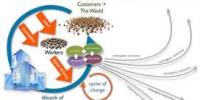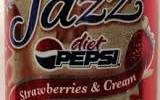Executive Summary:
Nestle is the world’s largest food group, not only in terms of its sales but also in terms of its product range and its geographical presence: Nestlé covers nearly every field of nutrition: infant formula, milk products, chocolate and confectionery, instant coffee products, frozen ready-made meals, mineral water etc. Nestle also a major producer of pet food.Nestle management provided their employees functionally with good environment, they also influences their employees various steps,like
gives their employees various training and knowledge’s .For this reason these employee more motivated and ready to make much more contribution to the organization
Mainly we focus this report how to maintain and what types of methods follow in training and development process. We also focus five steps. How to evaluated their employees performance appraisal. And tried to our best think,what types of training and development process should be followed for their employees increasing knowledge and skills.
We are acquired more experience to research and analysis this report, that help us future job performance. We also learn various things. We collecting data and some valuable information by internet from Nestle Bangladesh Ltd. Official web-site,friend and annual report. We create these report by Microsoft office 2003.
Finally,We thanked those people who are help through valuable information.Also special thanks our honorable Teacher Ayesha Bintte Saifullah for her guideline.
INTRODUCTION
1.1: Background of the Report
An employee might more knowledgeable and skilful by training and development program or process that maintaining an effective level job performance. So it acts an important role in HR department. As a part of BBA program, our Human Resources practices in Bangladesh course teacher Ayesha Binte Safiullah assigned us to prepare a report on HRM process and practice process in a multinational organization as related topic on Human Resource Practices in Bangladesh course. We have selected our report topic as “Training and Development in Nestle Bangladesh Ltd.”. We have made a survey for required information in Nestle official site in net. We have prepared our report on December 17, 2011 which will be submitted by December 19, 2011.
1.3: Objective of the Study
We have prepared this report based on two purposes. Those are-
1) To develop our Knowledge in Human Resources Management Program
2) And provide more Valuable Information gathered for who passionate employee to want to join in this company
1.3.1 Primary Objective:
The report aims to provide information on suggest more valuable step follow to make a training program effective of by the Nestle Bangladesh through HR department.
1.4 Scope of the Study:
There is a certain boundary to cover this report. Our particular report only covers Training and Development in Nestle Bangladesh Ltd. We mainly focus on Training and Development Program followed Nestle Bangladesh.
1.5: Limitations of the Study
We are lucky enough to get a chance to prepare a report on “Training and Development Process Bangladesh Ltd.” We tried heart & soul to prepare a well-informed report. But unfortunately we faced some difficulties when preparing this report. We tried to overcome the difficulties. In spite of trying our level best, some difficulties that hamper our schedule report work:
1.4.1 Shortage of time:
Within a short time, we need to prepare some other courses’ reports for in this session.
For this reason, we could not get a fluent time schedule for the report.
1.4.2 Limitation of related with the organization:
The employees of Nestle Bangladesh Limited were too busy of there work. For this, they did not sufficient time to fulfill our queries and some of them neglected us to support.
1.4.3 Difficulty in collecting data:
Many employers of the organization were not well known about all information that we asked them. Many of them also hesitated to answer the questions. These things hampered the information collection.
2.0 Methodology
2.1 Sources of collecting data:
We are collecting through two types,those are
I. Primary data II. Secondary data
Primary Data:
The employees of Nestle Bangladesh Limited were too busy of there work. For this, they did not sufficient time to fulfill our queries and some of them neglected us to support.
Secondary Data:
We collecting data and some valuable information by internet from Nestle Bangladesh Ltd.Official web-site and others web site, friends and many others peoples.
2.3 Software used:
Microsoft Word 2003
3.0 Company Profiles
Nestle Alimentana, Switzerland, a wholly owned subsidiary of Nestle Holdings Ltd. the Company expanded its product range with new products in instant coffee, noodles, sauces, pickles, culinary aids, chocolates and confectionery, dairy products and mineral water. Nestlé can trace its origins back to 1866, when the first European condensed milk factory was opened in Cham, Switzerland, by the Anglo-Swiss Condensed Milk Company. One year later, Henri Nestlé, a trained pharmacist, launched one of the world’s first prepared infant cereals ‘Farine lactée’ in Vevey, Switzerland. With headquarters still based in the Swiss town of Vevey. We employ around 280 000 people and have factories or operations in almost every country in the world. Nestlé sales for 2010 were almost CHF 110 bn. today Nestlé Bangladesh Ltd. is a strongly positioned organization. The Company will continue to grow through our policy of constant innovation and renovation, concentrating on our core competencies and our commitment to high quality, with the aim of providing the best quality food to the people of Bangladesh.
3.2 Nature of business
“Nature of Business” means what type of business your are doing? Like Wholesale, Retail or Service, Manufacturing, Marketing, etc. If you want more specific, then Furniture manufacturing, health Drinks marketing, etc. so as far we know that the nestle is a food manufacturing company with lots of food products and world widely is provided to all.
3.3.1 Mission and Vision
Nestle mission of “Good Food, Good Life” is to provide consumers with the best tasting, most nutritious choices in a wide range of food and beverage categories and eating occasions, from morning to night. Nestlé Bangladesh’s vision is to be recognized as the most successful food and drink Company in Bangladesh, generating sustainable, profitable growth and continuously improving results to the benefit of shareholders and employees
3.3.2 Purpose and principles
The Nestlé Corporate Business Principles are at the basis of company’s culture, which has developed over the span of 140 years. Since Henri Nestlé first developed his successful infant cereal “Farine Lactée”, we have built our business on the conviction that to have long-term success for our shareholders, we not only have to comply with all applicable legal requirements and ensure that all our activities are sustainable, but additionally we have to create significant value for society. A modular training programme will be rolled out on the various components of the Corporate Business Principles. The depth and focus of the trainings will be established in accordance with the materiality for the different functions within the company. For example, the training on the human rights components will focus on managers and employees in countries of higher human rights risks as a priority, with the aim to having completed the first training cycle by the end of the year.
Our Corporate Business Principles will continue to evolve and adapt to a changing world, our basic foundation is unchanged from the time of the origins of our Company, and reflects the basic ideas of fairness, honesty, and a general concern for people.
Nestlé is committed to the following Business Principles in all countries, taking into account local legislation, cultural and religious practices:
- Nutrition, Health and Wellness
- Quality Assurance and product safety
- Consumer Communication
- Human rights in business activities
- Leadership and personal responsibility
- Safety and health at work
- Supplier and customer relations
- Agriculture and rural development
- Environmental sustainability
- Water
3.3.3 Logo and Visual language
“Good Food Good Life” this is what the company takes as their visual language with a great logo which creates a brand awareness with standard and dignity.
3.3.4 Shareholders
Nestlé Bangladesh Limited started its first commercial production in Bangladesh in 1994. In 1998. Nestle S.A. took over the remaining 40% share from our local partner when Nestlé Bangladesh became a fully owned
subsidiary of Nestlé S.A.. And it’s the leading nutrition, health and wellness company.
3.3.5 Organ gram and organizational structure

In the organization of nestle the organizational structure is quiet simple, we can see from the structure that from the starting level the executive director is the main of the company in Bangladesh Paul Bulcke is the Chief executive manager of nestle. After that six officers are doing their responsibility as their post and grades. After that there are three divisional managers are working in the different divisions and sections. But the company like nestle just can’t think so easily they made various processes to maintain good division in organization.
3.4 Divisions of the company
By the turn of the century a new organizational form had begun to emerge. As businesses expanded into new markets and new products, the functional form failed to be efficient for managing a diversification strategy. By the 1950’s nearly all of the diversified firms listed in the Fortune 500 organized using the Multi-Divisional form (MDF). The MDF structure organized businesses under a headquarters that functions as banker, strategist, and coordinator for multiple business units (sometime termed “strategic business units” or SBU’s). This form is often characterized as organizing by outputs (products).
3.4.1 Human Resource division
We have chosen FMCG(fast moving consumer goods) sector because it is quite fragmented but the fastest growing sector. Even smallest companies in fmcg sector practices ‘ethical selling’.
To carry out our project, we met top executives in both organization. We have comprehensive discussion with all executives we met. In both organization we met marketing manager, head of sales and marketing department, sales administration and distribution manager, training manager ,sales representative , HR manager.
3.5Products and Services
Most people know us through our brands. Our portfolio covers almost every food and beverage category – giving consumers tastier and healthier products to enjoy at every eating occasion and throughout life’s stages including times of special nutritional need. Some exclusive products of nestle sales in Bangladesh are given below:
- Baby foods: Cerelac, Nido, NaturNes, Nestum
- Bottled water: Nestlé Pure Life, Perrier, Poland Spring
Chocapic, Cini Minis, Cookie Crisp, Estrelitas, Fitness, Nesquik Cereal
- Chocolate&confectionery:Aero, Butterfinger, Cailler, Crunch, Kit Kat, Orion, Smarties, Wonka
- Coffee:Nescafé, Nescafé 3 in 1, Nescafé Classic,Nescafé Decaff, Nescafé Dolce Gusto, Nescafé Gold, Nespresso
- chilled and frozen food:
Buitoni, Herta, HotPockets, Lean Cuisine, Maggi, Stouffer’s, Thomy
- Dairy: Carnation, Coffee-Mate, La Laitière, Nido
- Drinks: Juicy Juice,
- Food service: Chef, Chef-Mate, Maggi, Milo, Minor’s, Nescafé,
- Ice cream: Dreyer’s, Extrême, Nestlé Ice Creame
3.6 Recent company achievements
Nestlé was last week crowned the winner of the 27th World Environment Center (WEC) Gold Medal award for its commitment to environmental sustainability.
Paul Bulcke, Chief Executive Officer of Nestlé, accepted the award “on behalf of our Chairman and the 280,000 employees that make Nestlé today”.
Bulcke also stressed that “this award is a mandate, an obligation and motivation to do even better so that also future generations can enjoy Good Food and a Good Life with Nestlé.”The WEC Gold Medal Award is presented annually to a global company that has demonstrated a unique example of sustainability in business practice and is one of the most prestigious forms of recognition of a global company’s ongoing commitment to the practice of sustainable development.
Nestlé was originally announced as the winner in January, ahead of this month’s official prize ceremony.
4.0 Analysis and Findings
4.1 HRM practices followed by the company/ Specific HR sector like- Training and development:
Training and development is a vital and effective operation of an organization. It is people, not buildings that make a company successful.
Assets make things possible but people make things happen. And for making them efficient and hardworking company should provide training and development of their staffs and nestle do the same thing as all biggest and efficient companies do for their staffs and all over the human resource department, and employees play dual role in the company. First, as a factor of production. And second, it makes other factors operative and productive.
Five steps of training and development processes:
To make an efficient and well maintained management and training process a company can follow five steps which can be key success for the training process of the company, those cores five stages are:
Step-1 Need analysis: identifies the specific job performance skills needed, assessed the prospective trainees skills, and develops specific, measurable knowledge and performance objectives based on any deficiencies.
Step-2 Instructional design: this process is a process where we decide on, compile and produce the training programe content, including workbook, exercises, and activities.
Step-3: Validation step: these programes are represented in front of the small representative audience.
Step-4: Implementation: this step comprises of actually training the targeted employee group.
Step-5: Evaluation: management assesses the program’s success or failures
Training processes:
After all the assessment they found that if they provide some facilities they the staffs could be very efficient and those facilities are:
On-the job training: it’s a training which is operated at the sight of the company or training is carried out the working is running, it is really a effective process played by various well leading company and this system also played by the Nestle, but it is also a unavoidable risk because all new staffs can make a mistake or cause a loss to the company, therefore company plays that system when it’s right to do so. It is effective, when a major leveled employee do a mistake by mistakenly then, for making an improvement Nestle company plays that system.
Local training: these trainings are carried out within the country by reputed training institution from, Bangladesh slavery and labor training institute and consultant from foreign training institutes are invited to conduct training. These trainings are usually take place at a different venue other that the office.
In- house training: these trainings are basically held within the office premises and usually get conducted by the senior managers who are specialist in different field.
Training about the market survey: company plays a vital role in the market survey by sending their staff at market and operate a project by management to get the fluency and efficiency of the staffs.
Overseas training: company provides need based training to the employee through the usage of appropriate external training instate, which are very often conducted overseas. Most of the functional trainings are provided by foreign training.
Diversification training: it’s a process of training where staffs work at the different level and post of the management and identify the efficiency and effectiveness of their work ability.
Off-the job training: this process is also an effective training for internal staffs but it can be painful and fluctuate staff’s confidence and motivation, because it is quiet time consuming and costly which bared by company, but in may stages of the efficiency of a company or to make an efficient staff company may play this training. Where any temporary staff may work for the company with or without wages and this is actually not a job but binding for the staff to be full time staff, which is also depends on the performance of the staff.
Apprenticeship training: it is a process by which people become skilled worked through a combination of classroom instruction and on the job training . it is widely used to train individuals for many occupations. It traditionally involves having the learner apprentice study under the tutelage of a master craftsperson.
Computer based training: now a day all most all companies provide training to their staffs by computers and projectors, this system is so much effective and time saving device. By this, companies can express their plans, training, what to do and what is restricted by company and other authorities; it is a total pack of direct communication and training process.
Training and development some employees may have skills from their education or from previous jobs and therefore need little additional training. Others will need extensive training how much and kind of training is needed will depend on the type of job involved and the amount of training that has already been given through education and the coerces and the natural skills of the person employed. This section will be looking primarily at the type of training provided by organization to their employee. There are various type of training and those types are:
- Case study involving role play or discussion.
- Use of internal and external communication system.
- Interactive video where the trainee is required to respond- depending upon the response. The video will follow different sequence.
- Games and outdoor programs can teach a workforce to work in a team.
- Brainstorming
- Group reading
- Small group discussion
- Case study
Performance appraisal:
The process of monitoring individual and group performance, and giving helpful feedback for improvement, is generally called performance appraisal. The purpose of appraisals are:
- Helping the employee to overcome any problems or obstacles to performance.
- Identifying where an employee’s potential for improved performance and greater challenge could be better fulfilled.
- Setting goals and priorities for further monitoring and development.
The process will look at the employee as an individual, but will also ask how the employee help the organization to achieve its objectives.
Recommendations:
- It’s determining if training is the best method to achieve the desired changes.
- Learning objectives and outcomes of training is identified and specified clearly.
- Team or trainees should actively involved in the development of the learning program
- Senior management is committed to why and continued support of learning.
- The design of the content and delivery is easier and requires overall behavior changes clearly
- Easy to take into account culturally conditioned learning styles.
- A follow-up strategy in place to support continuity of changes is not required.
Finding:
The assignment was so interesting and complicated to, and for completing this assignment I and my group has worked very hard, and I needed so many planning to do this, each and every task has different commodity and factors. These not just helped me to doing assignment, i learned so many important things of administration of an organization and their day to day activities with relevant examples. For collecting samples and evidence for completing the assignment, I went so many places and searched via Internet search engine. And for searching I took help from google.com, ask.com etc. and a overview of it is given below:

Dessler, Gary, Human Resource Management
We took so many helps from various sources but we made some plans for completing the report, some facts that always worked in our mind that we have limited and short time, for that we planned with our scheduling, our individual contribution, then our way and source of information’ workability and proper helping and other some factors.
Conclusion
It can be said that Nestle is one of the best leading food manufacturing company in our Country. Moreover, the quality of this company’s product is world class.
We hope that this company will continue their business with lots of good food and bakeries. And also we are wishing that they will increase their branches all over the world. In addition, it can be observed that it creates a lot of employment facilities in our Country. For this reasons, we are proud of this company.
















